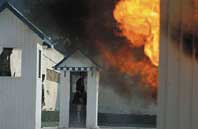 The right-wing government of Kostas Karamanlis has revealed its barbaric face to the whole of Greek society. Last Thursday, March 8, the Greek police brutally attacked a big demonstration of 30,000 university students in the centre of Athens. Dozens of students were heavily beaten about their heads, and 61 of them were arrested. Thousands of students suffered breathing problems after the "storm" of tear gas bombs unleashed by the special police forces.
The right-wing government of Kostas Karamanlis has revealed its barbaric face to the whole of Greek society. Last Thursday, March 8, the Greek police brutally attacked a big demonstration of 30,000 university students in the centre of Athens. Dozens of students were heavily beaten about their heads, and 61 of them were arrested. Thousands of students suffered breathing problems after the "storm" of tear gas bombs unleashed by the special police forces.
Many young people were taken to hospital with serious injuries. The hospital workers' union representatives at the Erithros Stavros Hospital publicly denounced the fact that many students were taken to the hospitals under police escort.
As is all this were not enough, the students who had been arrested were kept under complete isolation for three days with no access to their families or their lawyers. And all this took place in a country in this "civilized and democratic Europe", in Greece which has been used as one of the examples of economic growth within the European Union during the last few years...
Just after the brutal attack against the students the Prime Minister and president of the New Democracy party, Kostas Karamanlis issued a short but cynical statement: "Everything went well"! This declaration came two days after another provocative declaration on the part of the Minister of so-called "Public Order", Vyron Polydoras. His comments were about an earlier incident involving a policeman who shot at demonstrators on February 28. This was the first case of a policeman opening fire on a demonstration in Greece in 27 years!
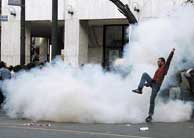 In his comments the Minister, who openly admits to being an admirer of Machiavelli, said that the policeman who had opened fire in an attempt to terrorize the demonstrators was "acting within the framework of legality".
In his comments the Minister, who openly admits to being an admirer of Machiavelli, said that the policeman who had opened fire in an attempt to terrorize the demonstrators was "acting within the framework of legality".
All this is an indication of the impasse of Greek capitalism. They need to attack the workers and youth on all fronts. Their system can no longer afford the concessions they made in the past. Thus these brutal attacks go hand in hand with the counter-reforms being carried out by the government. In the past they would have attempted some kind of compromise. Instead what we see now is more and more brutality.
There are clear symptoms of a regime that is turning more and more to police methods. After the students were arrested, instead of attempts to defuse the situation, we have more repression. Just after the students were arrested, the general prosecutor Isidoros Dogiakos immediately paid a visit to the General Headquarters of the Police and in record time he pressed charges against 12 of the arrested students. He also issued an order stopping the chairman of the Synaspismos party, Alekos Alavanos, from visiting the arrested students. And last but not least, last Sunday we saw articles appearing in the serious bourgeois press discussing "the possibility of using plastic bullets again against demonstrations", for the first time since the fall of the hated colonels' dictatorship in 1974.
Ongoing radicalisation of the youth movement
All these developments, together with the general political "atmosphere", reflect the tremendous concern of the ruling class in the face of an escalating youth movement. It is now almost one year since the student movement erupted and it has continued to mobilize. First there was the struggle of the university students and then last autumn this was followed by the schools students.
The first wave of struggle was from May to July 2006. After massive protests, demonstrations and faculty occupations, the government was forced to delay their plans to push through parliament a law that would prepare the ground for legalization of private Universities.
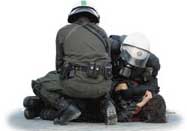 The second wave came in October when the school students occupied over 1000 high schools all over Greece, in a struggle against the government's policy to reduce the number of University places open to high school students. Together with this there were the student demonstrations in solidarity with the teachers that had been on strike for two months.
The second wave came in October when the school students occupied over 1000 high schools all over Greece, in a struggle against the government's policy to reduce the number of University places open to high school students. Together with this there were the student demonstrations in solidarity with the teachers that had been on strike for two months.
After about six weeks of very militant struggle the school student movement retreated under the pressure of a dirty campaign of lies and rumour-mongering. For example they terrorized bourgeois public opinion with fantastic stories about the students organising "sex orgies" during the occupations and so on. But the responsibility also lies on the shoulders of the Stalinists in the leadership of the movement who proved incapable of doing anything to answer this campaign and who also did nothing to win the active support of the working class.
The third wave of the youth movement became the critical point. This time the aim of the University student movement - having gained renewed confidence after the victory of last summer - was to put a halt to the attempts to revise article 16 of the Greek constitution which would open the door to the setting up of private universities.
A great victory with political consequences
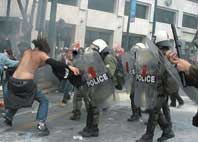 From January 10 onwards, every week the centre of Athens was full of thousands of students demonstrating in defence of state education. The University teachers also declared an all-out strike and they took their position into the movement.
From January 10 onwards, every week the centre of Athens was full of thousands of students demonstrating in defence of state education. The University teachers also declared an all-out strike and they took their position into the movement.
The results of this massive movement were spectacular. It forced the right-wing leadership of the PASOK - because of the fear of an open split in its parliamentary group - to withdraw all its MPs from the parliament debate and vote. This was to create a major problem for the ND government. In order for the amendment of article 16 to go through the government is legally bound to have the support of 180 MPs. But without the PASOK MPs the government only had 161, and therefore the amendment of the article had to be postponed to the next parliamentary session. This was an unexpected victory for the movement!
After this major defeat the government reacted immediately and defiantly by presenting once again for discussion in parliament the same law that the student movement had stopped with its mobilisation last summer. It was clear that the government was intent on getting revenge against the student movement that has been a point of reference in the struggle of the working class against of the government over this period.
PASOK and GSEE leaders save Karamanlis
The government's proposed law on the Universities - the so-called autonomy of the Universities - clearly states that the financing of the Universities will be according to their "productivity" and "usefulness to the economy" (i.e. to the capitalist corporations). Every University will have a finance manager whose responsibility it would be to link the University to the "market". Another important change that would be introduced by this law would affect the "right of asylum" of University students. At present this right protects students from police intervention, formally at least. The amendment would abolish this right.
This time, however, the leadership of the PASOK behaved like a "loyal opposition" to the government. Giorgos Papandreou announced that the party would not vote for the government's proposed law. He could afford to do this because he knows full well that the ND government on its own has the necessary number of MPs to guarantee a majority). But he then publicly presented an "alternative law" which was in essence a "copy" of the government's proposed law.
And just to make sure that that there were no misunderstandings as to where he stands he expelled from the party the ex-minister Kimonas Koulouris who has been going around describing himself as an "Andreo-Papandreist". [Andreas Papandreou was the father of the present leader of the PASOK and the left politician who founded the party in 1974]. The real "sin" committed by Koulouris was that he publicly attacked the right-wing PASOK ex-minister Theodoros Pagalos who had declared in the bourgeois press that the "police must be free to carry out there day-to-day task inside the University faculties"!
With all this happening, the leadership of the GSEE (Greek Confederation of Trade Unions) adopted a passive stance. In spite of repeated appeals from the students on the GSEE leaders to take action in support of the student movement, they remained silent. The mass bourgeois media also openly supported the government by creating a mood of hysteria and calling every day on the government to take "measures" to re-open the Universities.
The counterproductive role of the Anarchists
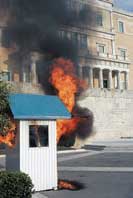 One of the most useful services offered to the government came from the anarchist groups who were mixed up with hooligan elements and all kinds of police provocateurs. Before the student demonstrations finished these groups started a "blind" and completely pointless battle with the special police forces, throwing stones and "Molotov cocktails". As a result, the police had the excuse they needed to smash up the demonstrations and terrorise the student activists.
One of the most useful services offered to the government came from the anarchist groups who were mixed up with hooligan elements and all kinds of police provocateurs. Before the student demonstrations finished these groups started a "blind" and completely pointless battle with the special police forces, throwing stones and "Molotov cocktails". As a result, the police had the excuse they needed to smash up the demonstrations and terrorise the student activists.
The government, aided by the mass media, tried to identify the big demonstrations with these small groups of anarchists. The minister of "Public Order", the extreme right-winger Vyron Polydoras, declared a "war of Order against the anarchist urban guerrillas and their political supporters". Thus after the events of March 8, the TV channels zoomed in on a fire lit by some anarchists or provocateurs in front of a national monument in Syndagma Square, the monument in question being treated in almost mystical terms by the national bourgeoisie, that of the Unknown Soldier. Although the square was full of students with sever injuries inflicted on them by the police the mass media showed over again and again the fire in front of the monument. The aim was clear: to whip up the more backward and petit bourgeois elements of society.
The student struggle continues
It is clear that the government is trying to avoid a big defeat over the question of amending the Constitution by diverting attention on to other questions and that explains its provocations, use of state terrorism and the spreading of hysteria among the petit bourgeoisie and presenting itself as the "defender of law and order". But all that this tactic is achieving is to make the students even angrier and more radicalised.
In reality without the help of the leaders of the PASOK and the GSEE the "New Democracy" government would no longer be able to stay in power. A very basic trade union solidarity action with the students and a modest left reformist opposition to the government would be enough to bring down this government. It has been in power now close to three years, and these have been full of class straggle on the one hand, and big corruption scandals on the other.
Although this week the law was voted in parliament, 280 university faculties remain under occupation and big demonstration have been called for the next few days. The students in a united front with the University teachers are continuing their struggle with the aim of stopping the law from being acted on. "This law is dead for us" the students have declared.
The students after one year of struggle have become very radicalised. Some of the more advanced layers have started to draw the conclusion that it is vital to link up with the workers' movement. They have also how important it is to separate the mobilizations from the politically criminal methods of anarchism while at the same time defending their struggle from state and police repression with class methods, together with the workers' movement.
As things stand at the moment, the most likely scenario is that the mobilizations will continue at least until the Orthodox Easter, next April. The combination of a determined and fighting mood on the part of the students with street mobilisation and the government's stubbornness in strengthening police repression it is not excluded that there may be some deaths. In reality the government is "playing with fire". If there were such a death, a massive wave of workers and youth protest would put an end to this government.
Whatever will be the exact scenario in the near future, one thing is sure: during these last few months what we have seen in Greek society are clear symptoms of future revolutionary developments. The youth is in a state of permanent radicalisation.
We must also not forget that the Greek workers have also demonstrated their willingness to change society by taking part in seven general strikes between March 2005 and December 2006! Class conflict in Greek society is becoming ever sharper. This is the clear message from this marvellous student movement. The escalation of state repression on the part of the Karamanlis government is another indication of the same process.
It is only the huge political vacuum on the left that explains why there is a delay in the political expression of this mood of radicalisation that is affecting the whole of society. The leaders of the Synaspismos and the KKE have come out in support of the student struggle but both with a wrong policy.
The KKE leaders try to avoid any kind of common action with the activists of Synaspismos, by following a sectarian tactic, which has nothing in common with the Leninist policy of the united front.
On the other hand, over one third of the Synaspismos leaders openly support the idea of Prodi-type government in Italy, while the remaining two thirds support a very "soft" left reformist policy, that cannot provide a solution to the problems of the Greek working class and youth.
That is why the only way forward for the worker and youth activists is in the struggle to build a new revolutionary leadership by defending a Marxist programme and policy inside the working class and youth movement and within the mass organisations of the working class. This is the struggle that in Greece the Marxist Tendency is dedicating itself to with enthusiasm and faith in the socialist future through its journal Marxistiki Foni.
See also:
- Greece: new wave of student protests against privatisation of universities by Stamatis Karagiannopoulos in Athens (January 16, 2007)
- Greece: ND government provoking shift to the left by Fred Weston and Stamatis Karayannopoulos (October 23, 2006)
- Greece: the government is retreating – the student movement is insisting (June 19, 2006)
- Greece - a powerful student movement is shaking the right wing government (June 12, 2006)
- May Day in Greece – small but militant rallies (May 2006)
- Greece: New general strike - the working class in revolt (March 2006)
- Greece: Biggest general strike in two years – the beginning of the end of Karamanlis by Stamatis Karayannopoulos (January 4, 2006)
- Greece: militant mood emerges under new right wing government by Fred Weston and Stamatis Karagiannopoulos in Athens (July 10, 2005)
- Massive general strike in Greece – A new stage in the class struggle (May 13, 2005)